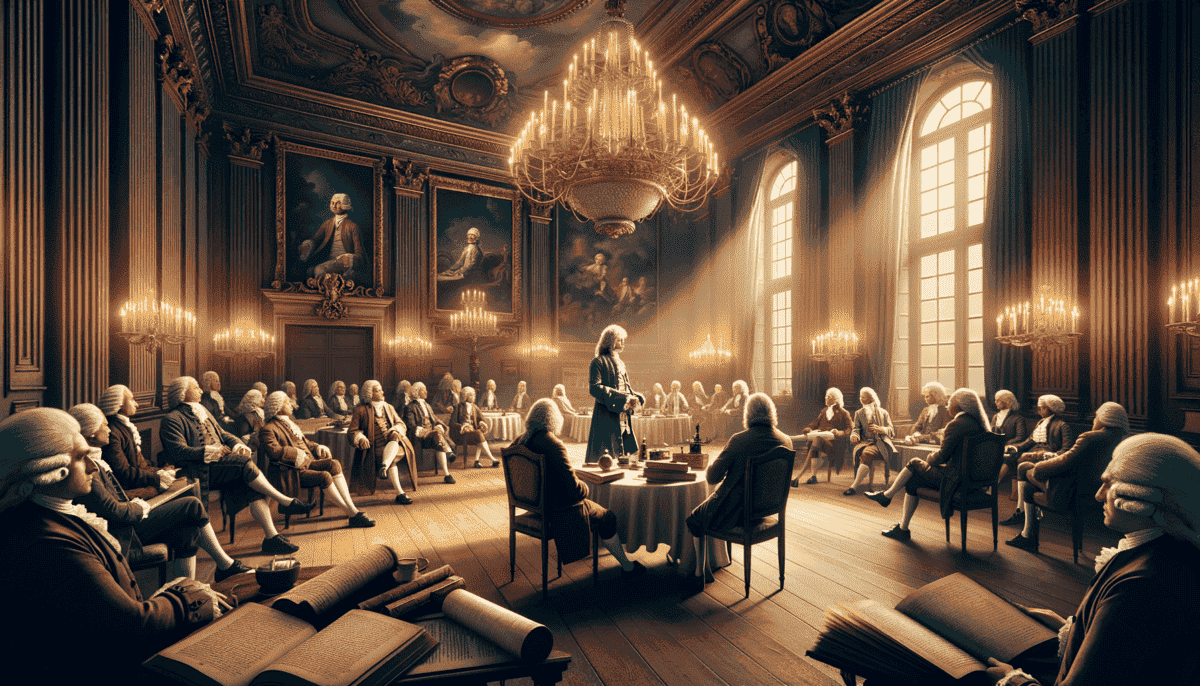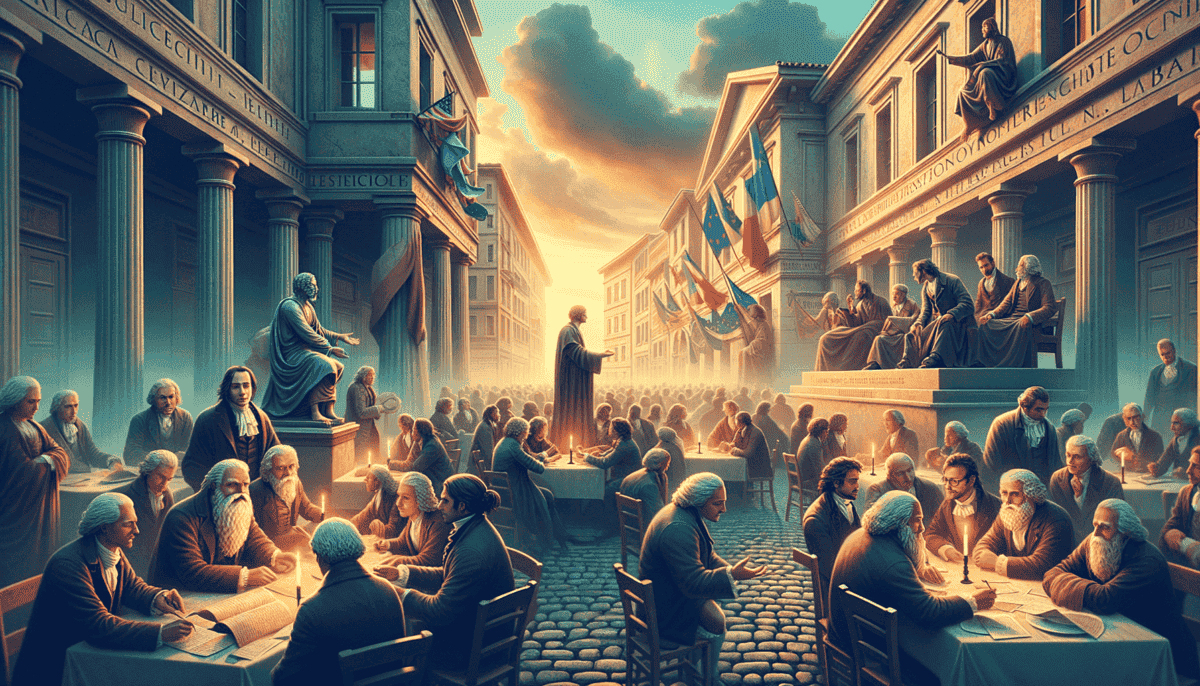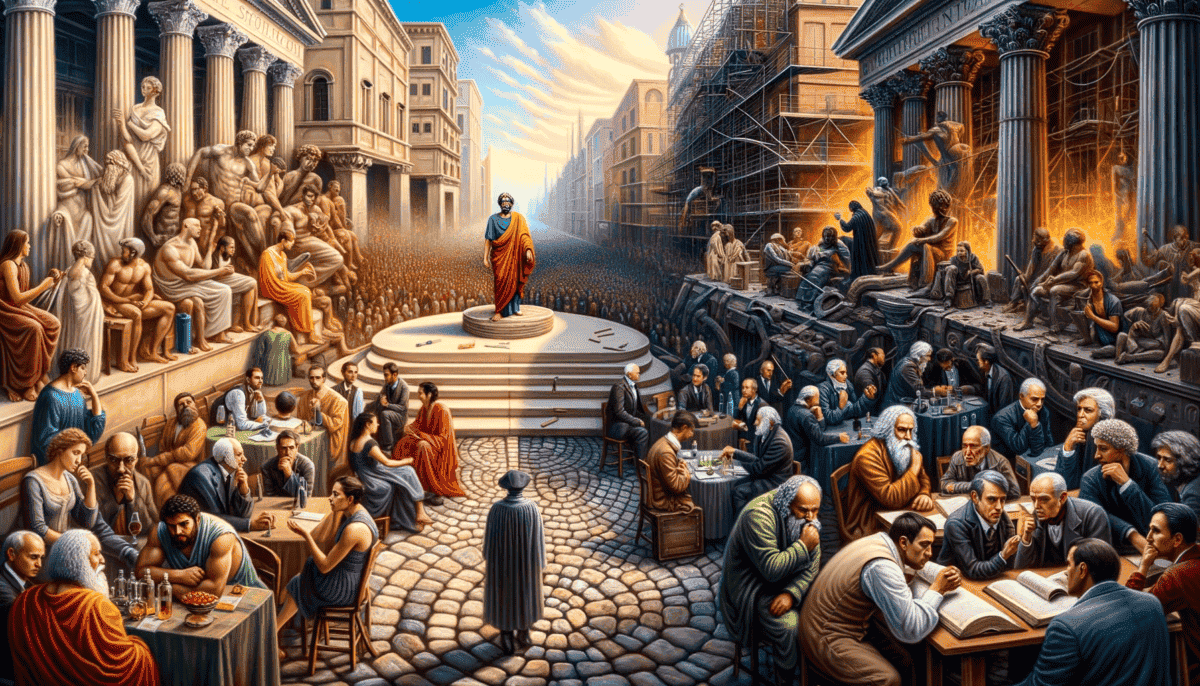The Spark of Questioning
The sun rose over Athens, painting the marble columns golden. A wise man named Socrates walked through the busy marketplace. He wore simple clothes and had a funny-looking beard. But his eyes sparkled with curiosity.
"Why do we follow these rules?" Socrates asked a group of young people who gathered around him. "Who made them? Are they fair?"
The children looked at each other, confused. Nobody had ever asked them such questions before.
“When we ask questions,” Socrates said with a smile, “we learn to think better. We become wiser.”
Every day, Socrates walked through Athens. He talked to everyone – rich people, poor people, workers, and leaders. He always asked questions that made people think hard about their lives and their city's rules.
But not everyone liked Socrates's questions. The powerful people in Athens got worried.
"He's making young people think too much!" one leader complained.
"His questions make people doubt our rules!" another shouted.
One day, the leaders of Athens told Socrates he was in big trouble. They said he was teaching bad ideas to young people. They wanted him to stop asking questions.
The Big Choice
The leaders gave Socrates two choices:
• Stop asking questions and leave Athens
• Or drink poison and die
Socrates stood tall in front of everyone. His friends were crying. They begged him to leave Athens and save himself.
But Socrates shook his head. "Questions help us find truth," he said bravely. "Without questions, we cannot learn or grow better. I would rather die than stop asking questions."
Even though Socrates died, his questions lived on. His student Plato kept teaching others to think and ask questions. More and more people learned that asking questions was important.
Today, thousands of years later, we still remember Socrates. We know it's good to ask questions about rules and leaders. We know it's important to think about why things are the way they are.
Little Sofia, a young girl in Athens today, looks up at the old buildings where Socrates once walked. She raises her hand in class and asks, "But why?" Her teacher smiles, remembering the brave man who taught us all to question.
The gentle breeze whispers through the olive trees, carrying the spirit of questions that started so long ago. Just like Socrates showed us, asking questions helps make the world better – one thought at a time.
The stars twinkled over Athens that night, just as they had when Socrates asked his first question. Somewhere, a child looked up at those same stars and wondered, "Why?" And so, the spark of questioning continued to shine bright.
Renaissance of Power
The streets of Florence bustled with life. A man named Niccolò Machiavelli walked through the crowded marketplace. He watched how people acted when they had power.
“Look at how the rich merchant treats his workers,” Machiavelli whispered to himself. “And see how different he acts around the city leaders!”
Machiavelli worked for the leaders of Florence. He saw how they made choices. Some were kind. Others were mean. But he noticed something important – being nice didn’t always help keep the city safe.
“Sometimes a leader must make hard choices to protect everyone,” Machiavelli thought.
The Big Change
One day, everything changed for Machiavelli. New leaders took over Florence. They didn’t trust him. They sent him away from the city he loved.
But Machiavelli didn’t give up. In his little house in the countryside, he started to write. He wrote about all the things he learned about power and leading people.
He wrote about important ideas:
• Leaders should try to be both loved and feared, but if they must choose, being feared is safer
“Dear Lorenzo,” Machiavelli wrote to Florence’s new leader, “I have watched rulers for many years. Let me tell you what I learned about keeping people safe and happy.”
New Ideas About Power
Machiavelli’s ideas were different from what people usually thought. Most people said leaders should always be good and kind. But Machiavelli said:
“Sometimes a leader must do things that seem mean to keep everyone safe. Like a doctor who has to give a shot – it hurts for a moment but helps in the end.”
People still talk about Machiavelli’s ideas today. Some agree with him. Others don’t. But everyone knows he made people think differently about power.
Little Marco, a boy in modern Florence, walks past Machiavelli’s old house. He sees how his school principal must sometimes make hard choices to keep everyone safe and happy.
“Being a leader isn’t easy,” Marco thinks. “You have to think about what’s best for everyone.”
The sun set over Florence’s beautiful buildings. Somewhere in the city, a young leader read Machiavelli’s words and thought about what it means to use power wisely. The questions he raised about power and leadership still echo through time.
As night fell, the stars shone over Florence just as they had in Machiavelli’s time. The city slept peacefully, protected by leaders who still struggled with the same big questions: How can we best take care of everyone? What makes a good leader?
Ideas That Changed Everything
The streets of London were busy with people talking about new ideas. John Locke sat in his cozy study, writing about freedom. In Paris, Jean-Jacques Rousseau walked through gardens, thinking about how to make life fair for everyone.
“Why should kings have all the power?” Locke asked his friend one morning. “Don’t regular people deserve a say in how things work?”
A New Way of Thinking
Locke looked out his window at children playing. “Everyone is born free,” he wrote in his notebook. “We should all have the same chances in life.” ⭐
“People should choose their leaders, just like how children choose their team captains at playtime,” Locke explained to visitors.
Across the water in Paris, Rousseau had similar thoughts. But he worried about rich people having too much power.
Spreading New Ideas
People started sharing these exciting ideas. They talked about them in coffee shops, wrote about them in books, and taught them to their children. ️
Here are some of their important thoughts:
• Everyone is born with rights that no one can take away – like being free and safe
Little Sarah, a printer’s daughter in London, watched her father print Locke’s words. “Papa, what does it mean that all people are equal?” she asked.
“It means, my dear,” her father replied, “that even kings must follow the same rules as everyone else.”
Ideas That Sparked Change
Kings and queens didn’t like these new ideas. They wanted to keep all their power. But more and more people learned about freedom and fairness.
Benjamin Franklin read these ideas in America. “These words could help us build something new,” he said to his friends. Young Thomas Jefferson nodded in agreement.
In France, people gathered in streets and cafes to talk about Rousseau’s ideas. They dreamed about a world where everyone had a voice.
The Power of Ideas
A young student named Marie watched the excitement grow. “It’s like watching a garden grow,” she said. “These ideas are like seeds, and they’re growing into something big!”
The sun set over Paris and London, but the light of these new ideas kept shining. People everywhere started to believe they deserved to be free and equal. Big changes were coming, and nothing would ever be the same.
As night fell, Locke and Rousseau’s words traveled across oceans and continents. They gave hope to people who dreamed of a fairer world. The biggest changes were still to come.
When Ideas Turn Into Action
The warm summer breeze carried excited whispers through the streets of Philadelphia. The year was 1776, and big changes were coming.
Thomas Jefferson sat at his desk, quill in hand. He thought about all the ideas he learned from Locke and Rousseau. “We need to write something special,” he said to Benjamin Franklin. “Something that tells the world why we want to be free.” ✍️
A Brand New Country
“All people deserve to be free,” Jefferson wrote. His words would become the Declaration of Independence. It was like a letter to the world explaining why America wanted to be its own country.
“We hold these truths to be self-evident, that all men are created equal…” These words changed everything!
Across the ocean in France, people were getting excited too. They read about America’s brave choice and wanted the same freedom.
Two Big Changes
In America, people like George Washington led armies to fight for freedom. They weren’t just soldiers – they were fighting for ideas about fairness and equality.
Little Tommy, a farmer’s son, watched the soldiers march by. “Papa, why are they fighting?” he asked.
“They’re fighting for your future, son,” his father answered. “So you can grow up in a free country.” ️
A New Way to Run Countries
These big changes showed the world something important:
• Regular people could work together to make their own rules and choose their own leaders
In France, a young girl named Marie Antoinette watched from her palace window as people filled the streets of Paris. They wanted the same freedoms as America.
Lafayette, a French hero who helped America, smiled as he saw both countries changing. “Ideas are like stars,” he said. “Once they start shining, they light up the whole world.” ⭐
Making Dreams Come True
People everywhere watched what happened in America and France. They saw that big dreams about freedom could come true.
The sun set on a different world than before. Kings and queens weren’t as powerful anymore. Regular people had more say in how their countries worked.
Young students in schools learned about these exciting changes. “Maybe someday we’ll make the world even better,” they thought.
As night fell over Philadelphia and Paris, the stars twinkled like hope in the sky. The ideas of freedom and fairness were spreading everywhere. More changes were coming, and the world would never be the same.
Brave New Thinkers
The streets of London were busy with workers rushing to factories. The year was 1848, and Karl Marx watched them with sad eyes.
“This isn’t fair,” Marx said to his friend Engels. “We need to think of a better way.” They wanted everyone to have enough food and nice homes.
New Ideas About Money
Marx wrote about sharing things fairly. He thought workers should own the factories they worked in. His ideas made rich factory owners angry, but gave hope to poor workers.
“Workers of the world, unite!” became a special message that spread everywhere.
Little Anna, a factory worker’s daughter, asked her father, “Why do you work so hard but we still have so little?”
“That’s why Mr. Marx is writing his book,” her father smiled. “He wants to help families like ours.”
A Different Kind of Thinker
In Germany, Nietzsche walked in the mountains alone. He thought about how people could be stronger and braver. “We need to think for ourselves,” he wrote. “Not just follow what others say.” ️
Here are the ways these thinkers changed the world:
• They made people question things that weren’t fair
• They helped people imagine better ways to live
• They gave hope to people who wanted change
• They showed that big ideas could change the world
Ideas Spread Like Wildfire
Workers started meeting in secret to talk about Marx’s ideas. They dreamed of a world where everyone had enough. Students read Nietzsche’s books and felt brave enough to think differently.
In factories and universities, people started talking about these new ideas. Some leaders got scared. They didn’t want things to change.
Making Waves
Sarah, a young teacher, told her students, “Big changes start with brave questions. Never be afraid to ask why things are the way they are.” ✨
As these ideas spread, more people started standing up for their rights. Workers asked for better pay. Students asked for better schools. Everyone wanted a fairer world.
The sun set on busy cities and quiet villages. People everywhere were thinking about these new ideas. Some were excited, some were scared. But everyone knew more changes were coming.
The stars came out over London, where Marx was still writing. Over Germany, where Nietzsche’s words echoed in the mountains. Their ideas were like seeds, growing into something new and powerful.
Ideas That Change Everything
The morning sun rises over a modern city. Students walk to school with backpacks full of books. Workers head to offices with phones in their hands. The world looks very different from when our story began.
Maya sits in her classroom, raising her hand. “Why do we vote?” she asks her teacher. Just like Socrates, she wants to understand why things are the way they are.
Ideas That Last Forever
“Our votes matter because of people like John Locke,” her teacher explains. “He helped us understand that everyone should have a say in how their country works.”
“When we ask questions like Socrates, think about fairness like Marx, or dream big like Rousseau, we make the world better,” the teacher smiles.
After school, Maya sees a protest downtown. People hold signs asking for better pay. She remembers learning about Marx and how he wanted workers to be treated fairly.
New Problems, Old Wisdom
These are ways philosophers still help us:
• They teach us to ask important questions
• They show us how to think about hard problems
• They help us imagine better ways to live
• They give us courage to make changes
Tomorrow’s Thinkers
In libraries and on computers, young people study the ideas of great thinkers. They use these old ideas to solve new problems.
Around the world, people use social media to share ideas, just like philosophers shared books long ago. They talk about making the world fairer and better.
The Story Continues
That evening, Maya writes in her diary: “Today I learned that big ideas can change the world. Maybe my ideas will help people someday too.” ✨
She looks out her window at the city lights. Somewhere, another young person is asking questions, just like Socrates did. Another is writing about making things fair, just like Marx did. Another is dreaming of a better world, just like Rousseau did.
The stars shine down on cities and villages all around the world. The same stars that watched Socrates teach, Machiavelli write, and Marx think about fairness. Under these stars, new ideas are growing, new questions are being asked, and new dreams are taking flight.






